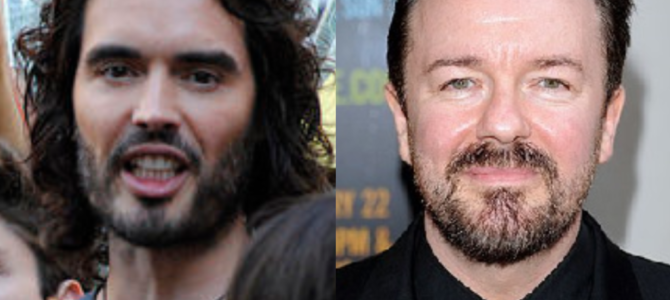
It’s day 2,346 of staying home, and if you’re like me, you’ve streamed yourself into a coma. I actually watched the John Gotti biopic starring John Travolta the other day, that’s how bad it’s getting (It wasn’t as bad as you’d think).
If your brain and soul are hungry for something deeper, two surly, foul-mouthed British comedians are here to the rescue. In the most recent episode of his podcast “Under the Skin,” comedian Russell Brand interviews fellow British comedy luminary Ricky Gervais. I became a fan of Brand’s podcast after his two amazing conversations with Jordan Peterson, both of which also provide excellent intellectual calisthenics.
The hour-long episode covers everything from Gervais’s love for animals, their narcissism, and the nuances of God, spirituality, and religion. While you may not agree with either, seeing these two exceptionally bright, self-effacing, piss-and-vinegar comedians exchanging barbs and wisdom is just the mental stimulation you need today. Their own search for the truth might even prompt the sort of self-reflection we all could use at this time. Here’s a sneak preview.
On Class and (Dis)Respect for Authority
Brand and Gervais are millionaires many times over and enjoy even greater fame in Britain than in the United States. Still, neither came from wealth or acclaim. Brand was an only child raised by a single mom. Gervais’ signature edgy humor is inextricably tied to growing up in the working class. Knowing where they stand in society can be tricky.
As Gervais explains, “We’re court jesters — we have to be court jesters. We have to have low status. We’re in the mud with all the other peasants, teasing the king. … But we have to keep our low status somehow, I think. I feel I want to.”
On Narcissism and Reality TV Culture
Gervais is the creator of the original “The Office” series, and Brand talks about feeling sorry for his character, David Brent. The pair both see him as a sad figure, engaged in ever more absurd acts in order to reach a place of acceptance or worth. Compared to our reality TV culture nowadays, this character isn’t even absurd anymore.
As Gervais jokes, “Big Brother” contestants make deals with the producers to get on the show. “‘Let me in there, and I’ll start a fight and take my clothes off.’” It facilitates the emotional destruction of people who just want to be loved — and the public eats it up. As Brand puts it, “There’s been a glorification of idiocy in culture.”
Gervais laments the toll this takes on fame-seekers. “This obsession with seeing normal people destroy themselves. … These people keep going back to fame and going, ‘Do you love me yet?’ No, they don’t love you, they want you to fail!”
On God, Spirituality, and Atheism
Gervais is a well-known atheist. While both men have substantial criticism for organized religion, Brand’s travels through addiction and mental illness have given him a firm belief in some kind of god and a sense of interconnectedness.
“I’m a solipsistic, narcissistic person,” Brand says. “I’ve been through the mills of addiction, sex, fame, drugs, money, and all that kind of stuff, and it’s placed me at a point where I’ve had to open myself up to different ideas.”
He means this as a challenge to Gervais — that while they both have criticisms for organized religion, Brand sees Gervais as having a similar sense of wonder and awe at the universe, the same wonder that prompted Brand’s spirituality.
Gervais concedes, “I seem like a spiritual person, but not literally, which is totally true. I am in as much awe at seeing a tree, or a mountain, or a bird, or a river as anyone who thinks God made it. I see the beauty of nature.”
While Brand sympathizes with Gervais’ distaste for the constraints of organized religion, he explains, “I’ve gone on sort of the opposite journey, in that I feel like I started off atheistic just in that I would reject any attempt to impose regulation or control on me for the purposes of domination.”
“But as I’ve gone through my own stuff with addiction and mental health or whatever it is,” Brand continues, “my own sense of despair — particularly looking at it from a perspective of mental health issues and addiction — is that there is an unaddressed yearning for a kind of oneness, togetherness, and for love.”
While Gervais understands that desire for connectedness, he doesn’t think desire alone is enough to make it true. “It is a terrifying prospect … that we’ll never exist again, I think, but it doesn’t mean it’s not true,” says Gervais.
“The bottom line is I can’t believe something I don’t believe. So how do I find meaning? Well, we are here. The chances of us being us — you being you and me being me, existing now, that sperm hitting that egg — is 400 trillion to one. We’re not special, but we are lucky. We do exist. It’s incredible.”
As we’re looking for ways to occupy our minds in this strange time, this conversation is worth a listen. You may disagree with Brand or Gervais’ conclusions; I do. The redeeming undercurrent, however, is that both men are seekers of the truth. Their convictions are born of deep consideration, and they are willing to follow them to their natural conclusions, no matter how disappointing or inconvenient. Now might be just the moment we need to consider what we really believe as well.









